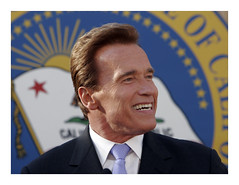Voters On Machismo and Women
Is the Arnold Schwarzenegger who cheated on his wife and may have groped other women the type of governor California voters asked for? In a Politico opinion piece, Neal Gabler says yes.
One might think that when it came to governing, the public might actually like the idea of someone who portrays himself as rational, deliberate, attentive to opposing points of view — a conciliator rather than a head-banger. But Americans have always thought of themselves as tough and uncompromising — able to beat their problems or enemies into submission. Older white men, a key part of the Republican Party base, seem particularly to want their politicians to be heroic and full of bluster — just like Schwarzenegger.
Not coincidentally, this is also the very thing that Americans, again especially men, have always loved about their movie heroes. Our most popular films are predicated on a bold individual who, usually without much outside assistance or much internal reflection, vanquishes everything before him. Our heroes get the job done, whatever it takes.
And again, not incidentally, they also get the woman, who swoons in the cloud of his testosterone. We all know that female subjugation is one component of the American male power fantasy.
It is no wonder, then, that our movies and politics would become conflated, especially in California, home of the motion picture industry. Schwarzenegger’s appeal in the gubernatorial race was that he came on like a hero, the un-Gray Davis, California’s then-governor, who seemed aptly named. Davis appeared wimpy. Arnold seemed … like Arnold. He was everything that a movie hero and a governor ought to be: a real man’s man.
But that sense of untrammeled masculine power is also embedded, in politics as in the movies, with a certain attitude toward women. Our film heroes aren’t gauzy romantics. They are sexual swashbucklers who often have little use for women — or, more accurately, have one use for women.
Though he had tempered his public misogyny since his bodybuilding days, Schwarzenegger wasn’t elected in spite of his disregard for women. Insofar as it informed his machismo and demonstrated his masculine power, he was elected because of it.
 This goes back to what I wrote last year about politicians who insult their opponents by saying they should “man up.” The phrase implies that manliness and machismo are requirements to hold elective office. It’s not a big leap between that attitude and the lack of female elected officials in this country compared to the rest of the world.
This goes back to what I wrote last year about politicians who insult their opponents by saying they should “man up.” The phrase implies that manliness and machismo are requirements to hold elective office. It’s not a big leap between that attitude and the lack of female elected officials in this country compared to the rest of the world.
Gabler analysis of how voters feel about politicians gives insight into how some voters feel about women and their role in politics. Macho heroes in films, he writes, don’t have any use for women except one. The implication is that one reason is sex. The female character can’t do anything else for the macho hero – not help him, not work with him, not take the lead as the hero. If sex is the only thing the macho hero needs from women, and voters look at their political candidates and movie heroes in similar ways, is sex the only thing those macho-loving voters expect from women?
This is more than just what voters want from their candidates. It’s about the public’s expectations for women.
Gabler takes an odd turn at the end. He surprisingly – and wrongly – excuses Schwarzenegger’s actions:
But you can’t really blame Schwarzenegger for hitting on women, even his own housekeeper. He was simply acting out the male fantasy that men had already imposed on him.
Schwarzenegger is a grown man with free will. He made bad choices and needs to own them. Don’t blame society. Giving Schwarzenegger and other politicians a pass is what allows sexism in politics and everywhere else to continue.
Read Gabler’s entire piece here.
UPDATE:
I just found the following bite from a January article in the New York Times Magazine. I set it aside for a post I was trying to write earlier this year that never came together (which just proves it’s a good idea to save those unfinished ideas and occasionally go back to them!).
In the Times piece, Rebecca Traister, who authored “Big Girls Don’t Cry: The Election That Changed Everything for American Women” about the 2008 presidential election, wrote:
The mythos of our founding revolves entirely around fathers, save for the seamstress Betsy Ross and the querulous spouse Abigail Adams.
What we do have, to serve as the foundational fantasy of female strength and individualism we’ve agreed upon as embodying American power, are cowgirls: Annie Oakley, Calamity Jane, the outlaws, frontier women and pioneers who pushed West, shot sharp, talked tough and sometimes drew blood. Frontier womanhood has emerged as one of the only historically American models of aspirational femininity available to girls — passive princesses and graceful ballerinas not being native to this land — and one of the only blueprints for commanding female comportment in which they are regularly encouraged to invest or to mimic.
Compared to male leaders, Traister wrote in the piece, “We have made considerably less imaginative space for ways in which women can persuade us of their ability to lead.”
So, women must have that macho swagger for elective office, too. But if they made the same sexual transgressions as some male politicians have, I don’t think the public would be as forgiving of them and as forgetful of the sexual wrongdoing.
See Also:
Man Up And Cry
Photo Credit: NOVAOnline/Flickr